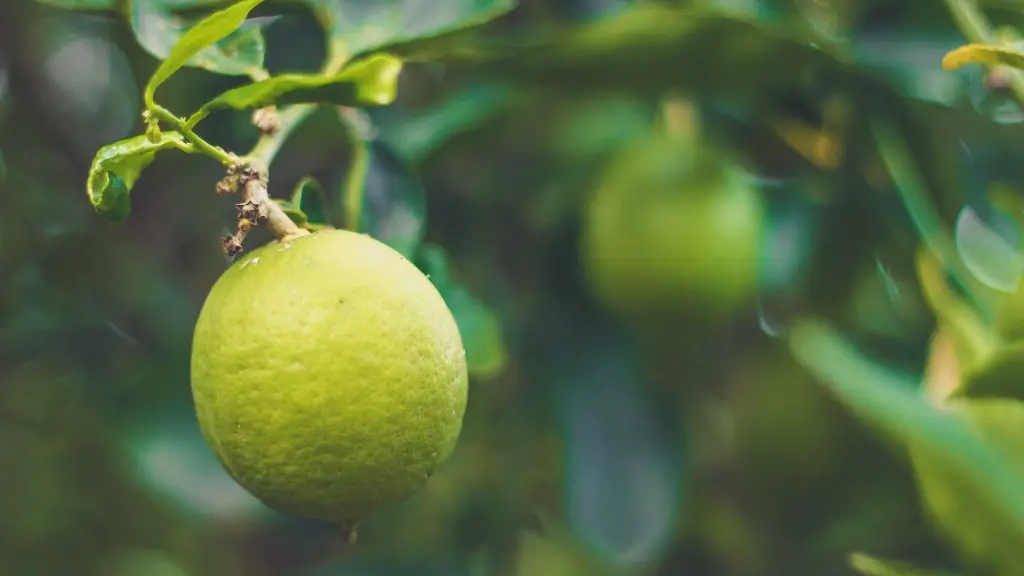The annual shedding of leaves from trees is a natural occurrence. Yet, for many of us, the sight of our once lusciously leafy Meyer lemon tree suddenly losing its leaves is an unfortunate reality. Many of us may assume that the tree is dying, however, the reasons behind the fallen leaves could be varied and warrant further investigation.
Firstly, yellowing leaves could be a sign of nutrient deficiencies, due to an inappropriate watering or fertilizing schedule. This is often caused by an imbalance of nitrogen, iron and magnesium found in the soil. Through a soil test, you can determine the nutrients present in the soil, as well as diagnose any deficiencies. Additionally, over-watering or under-watering can both lead to yellowing leaves and eventual leaf dropping.
Secondly, environmental factors may be to blame for the falling leaves. Too much sun or wind can cause the leaves to dry out and drop from the tree. If you notice water droplets on the leaves during the morning, it’s usually a sign that your tree is not getting enough water. Improper drainage can lead to root rot, which will weaken the tree, thus leading to leaf loss.
Thirdly, other pest infestations and diseases can be common culprits of leaf shedding. If you notice any tiny spider web-like structures on the tree, it could mean that your tree is infected with spider mites. These pests suck the life out of the leaves, thereby leading to yellowing, drooping and eventual defoliation. Additionally, unhealthy leaves often become a breeding ground for diseases, like citrus greening. To identify if there are any pests present, take a closer look at your tree and if spotting anything suspicious, it is advisable to contact your local county extension office.
Fourthly, sometimes Meyer lemon trees can be temperamental. If they are not happy with the climate they are living in, they may shed their leaves in an effort to survive. Cooler climates with temperatures below 55°F can cause the leaves to drop, as the tree struggles to stay warm. Additionally, older trees may experience an annual leaf shedding as a means of self-pruning, so that the tree is not overgrown with too much foliage.
Soil Testing
To better understand why your Meyer lemon tree has started dropping its leaves, it can be beneficial to conduct a soil test. This will help you to identify the nutrients and minerals that the tree requires to generate strong, healthy leaves. Test kits are available in many garden centers and can be used to determine the pH level and nutrient content of your soil. Follow the instructions included in the kit and if the results are low in certain required minerals, amend the soil accordingly.
Environmental Factors
It is essential to determine where you are placing your tree, as environmental factors such as direct sunlight and wind can create negative impacts on the tree’s health. If sunlight is too strong, move the tree to an area of the yard that is shaded at least part of the day. On the flipside, if the soil is staying wet and damp, try to amend the soil with compost and other soil additives to improve drainage.
Pest Control
Pest infestations and disease can cause great damage to your Meyer lemon tree and should be addressed swiftly. If you suspect your tree is infected, it is best to contact your local county extension office or a garden center specialist. A few natural remedies to combat pests include spraying the leaves with neem oil, using insecticidal soap, or using diatomaceous earth. Additionally, applying a generous layer of mulch around the tree can act as a physical pest barrier and discourages the movement and feeding behavior of pests.
Tree Happiness
Finally, if the tree has dropped its leaves due to an unsuitable climate, consider relocating your Meyer lemon tree to a place that is suitable. A slight change in position, such as a shaded area or a more enclosed place, can often bring back the failing tree to life. On the other hand, if the tree does not respond to environmental changes and continues to drop leaves, it may be time for a new tree.


